Table of Content
- What is Off-Page SEO?
- How to Do Off-Page SEO?
- Off-Page SEO vs On-Page SEO
- Why is it Important for Your Website?
- 3 Types of Links for Off-Page SEO
- Factors That Influence Link Value for Off-Page SEO
- Benefits of Off-Page SEO
- Pros and Cons of Off-Page SEO
- Cumulative Impact of Off-Page SEO
- How to Get Useful Links to Boost Off-Page SEO?
- How to Avoid Google Penalties for Unnatural Links?
- Conclusion
SEO (Search Engine Optimization) is important for making your website easier to find and getting more visitors without paying for ads. While on-page SEO focuses on optimizing elements within your website, off-page SEO involves activities outside your website that impact its ranking on search engine results pages (SERPs). This comprehensive guide will explain what off-page SEO is, how to do it, the difference between off-page and on-page SEO, its importance, and the types of links and factors that influence link value.
What is Off-Page SEO?
Off-page SEO means all the things you do outside your website to make it show up higher in search results. This includes link building, social media marketing, influencer outreach, and more. Unlike on-page SEO, which deals with elements you can control on your own site, off-page SEO focuses on increasing the authority and trustworthiness of your site through external methods.
Key Components of Off-Page SEO:
- Link Building: Acquiring backlinks from other reputable websites to your own.
- Social Media Marketing: Promoting your website content on social media platforms.
- Influencer Outreach: Collaborating with influencers to create content or promote your site.
- Guest Blogging: Writing articles for other websites with a link back to your site.
- Brand Mentions: Getting your brand mentioned on other websites without a direct link.
How to Do Off-Page SEO?
1. Link Building
Link building means getting other websites to put links that lead back to your website.
Search engines use links as one of the primary ways to determine how trustworthy and authoritative your website is.
Strategies for effective link building:
- Create High-Quality Content: Develop valuable content that other sites will want to link to.
- Reach Out to Influencers: Contact bloggers and influencers in your niche to share your content.
- Guest Posting: Write articles for other reputable sites and include links to your site.
- Broken Link Building: Look for links that don’t work on other websites and offer your content as a replacement.
2. Social Media Marketing
Social media marketing involves promoting your website content on platforms like Facebook, Twitter, LinkedIn, and Instagram to drive traffic and increase engagement.
Tips for social media marketing:
- Share Valuable Content: Post content that is useful, informative, or entertaining.
- Connect with Your Audience: Reply to comments, join discussions, and build friendships.
- Use Hashtags: Use relevant hashtags to make your posts easier to find.
- Run Ads: Invest in social media advertising to reach a larger audience.
3. Influencer Outreach
Influencer outreach is the process of partnering with influencers who have a large following in your industry to promote your content or website.
Steps for influencer outreach:
- Identify Influencers: Find influencers in your niche with a substantial following and engagement.
- Build Relationships: Engage with them on social media and build a rapport before reaching out.
- Pitch Your Idea: Present a clear and compelling reason why they should collaborate with you.
- Offer Value: Provide something of value in return, such as free products, services, or payment.
4. Guest Blogging
Guest blogging involves writing articles for other websites in your industry, with the goal of getting a backlink to your own site.
Benefits of guest blogging:
- Increases Backlinks: Gain high-quality backlinks from reputable sites.
- Boosts Authority: Establish yourself as an expert in your field.
- Drives Traffic: Attract visitors from the host website to your own.
5. Brand Mentions
Brand mentions occur when other websites mention your brand, even without a direct link to your site. Search engines consider these mentions as a sign of authority and credibility.
How to get brand mentions:
- Create Shareable Content: Develop content that is likely to be mentioned by others.
- Engage in Industry Discussions: Participate in online forums, blogs, and social media discussions.
- Use Press Releases: Distribute press releases to announce significant news about your brand.
Off-Page SEO vs On-Page SEO
On-page SEO involves optimizing elements within your website, such as content, HTML code, and site structure. Off-page SEO, on the other hand, refers to actions taken outside your website to impact your rankings.
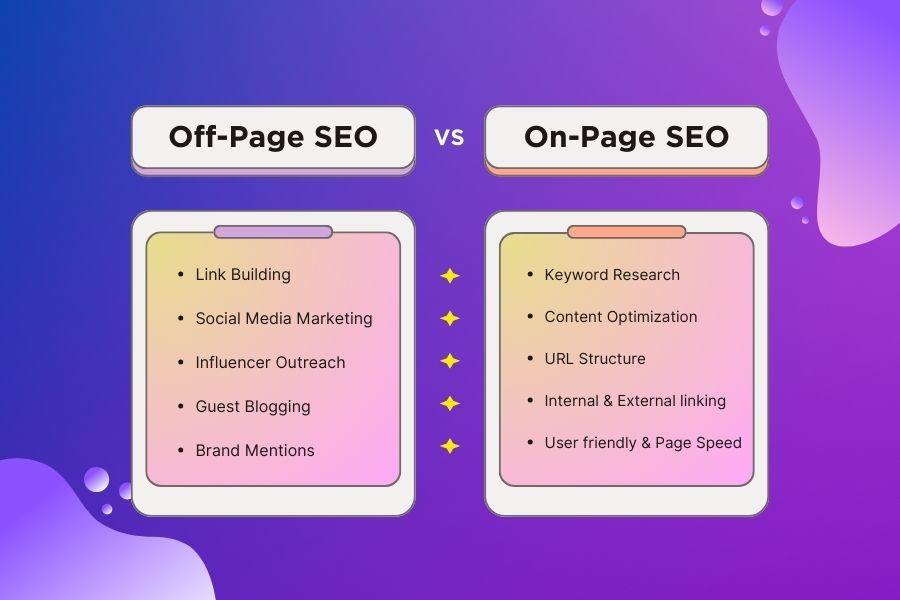
Key Differences:
- Control: On-page SEO elements are within your control, while off-page SEO relies on external factors.
- Focus: On-page SEO focuses on improving user experience and content relevance, whereas off-page SEO aims to build website authority and credibility.
- Techniques: On-page techniques include keyword optimization, meta tags, and internal linking. Off-page techniques involve link building, social media marketing, and influencer outreach.
Why is it Important for Your Website?
Off-page SEO is crucial for several reasons:
- Improves Search Engine Rankings: Backlinks from reputable sites signal to search engines that your site is trustworthy and authoritative, which can improve your rankings.
- Increases Website Traffic: Higher rankings lead to increased visibility and more organic traffic.
- Enhances Domain Authority: Regularly earning high-quality backlinks can boost your domain authority, making it easier to rank for competitive keywords.
- Builds Brand Awareness: Off-page SEO activities like social media marketing and influencer outreach help increase brand visibility and recognition.
- Strengthens Reputation: Positive brand mentions and backlinks from credible sites enhance your online reputation.
3 Types of Links for Off-Page SEO
1. Natural Links
Natural links are backlinks that are given editorially without any action on your part. They are the result of other websites finding your content valuable and linking to it naturally.
Example: A blogger writing a post about SEO best practices and linking to your article as a reference.
2. Manually Built Links
Manually built links are acquired through deliberate link-building activities, such as outreach and guest blogging.
Example: Reaching out to an industry influencer and requesting a link to your content.
3. Self-Created Links
Self-created links are added by you on forums, blog comments, or online directories. While these links can drive traffic, they are often considered low-quality and can be risky if overused.
Example: Including a link to your website in a forum signature or blog comment.
Factors That Influence Link Value for Off-Page SEO
Not all links are created equal. Several factors determine the value of a backlink and its impact on your SEO efforts.
- Domain Authority: Domain authority (DA) is a score created by Moz that guesses how likely a website is to show up high in search engine results.
- Backlinks: Links from high-DA sites are more valuable.
- Relevance: The relevance of the linking site to your content matters. Links from sites in your industry or related to what you do are better than links from sites that are not related.
- Link Placement: Links placed within the main content of a page are more valuable than those in footers, sidebars, or comments.
- Anchor Text: Anchor text is the clickable text of a hyperlink. Optimized anchor text that includes relevant keywords can enhance the link’s value.
- Link Context: The context surrounding the link also matters. Links within relevant and high-quality content are more valuable.
- Link Type: Dofollow links pass on link equity and contribute to your site’s SEO, while nofollow links do not pass on link equity but can still drive traffic.
- Link Diversity: Having a diverse backlink profile with links from various sources (blogs, news sites, forums) is more natural and beneficial for SEO.
- Link Freshness: Newer links tend to have a more significant impact on rankings. Continuously acquiring fresh links signals to search engines that your site is active and relevant.
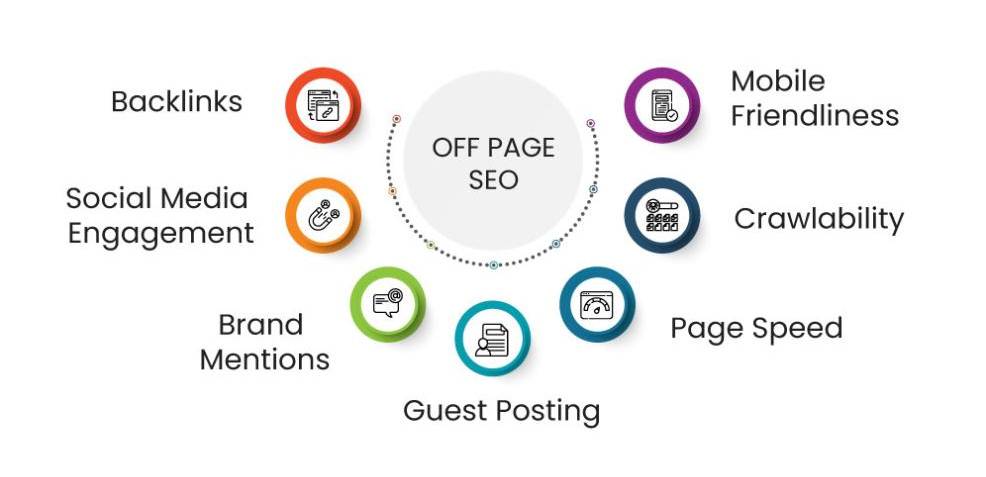
Benefits of Off-Page SEO
Off-page SEO offers several benefits that can significantly improve your website’s performance and visibility.
- Higher Search Engine Rankings: Backlinks from reputable websites signal to search engines that your site is trustworthy and authoritative, which can lead to higher rankings in search results.
- Increased Website Traffic: Higher rankings result in more visibility, leading to an increase in organic traffic. More visitors to your site can mean more potential customers and conversions.
- Improved Domain Authority: Consistently acquiring high-quality backlinks can boost your domain authority, making it easier to rank for competitive keywords and phrases.
- Improved Brand Awareness: Activities outside your website, like social media and working with influencers, help more people know and recognize your brand. This can lead to more people becoming aware of your brand and what it offers.
- Strengthened Online Reputation: Positive brand mentions and backlinks from credible sites enhance your online reputation. A strong reputation can attract more visitors and build trust with your audience.
- Better Local SEO: Off-page SEO techniques, like local citations and reviews, can improve your local search rankings, making it easier for customers in your area to find you.
- Increased Social Signals: Sharing your content on social media platforms can lead to more social signals, such as likes, shares, and comments. These signals can indirectly impact your SEO by driving traffic and engagement.
Pros and Cons of Off-Page SEO
While off-page SEO offers many benefits, it also has its drawbacks. It’s essential to weigh the pros and cons to determine the best strategy for your website.
Pros:
- Boosts Rankings: Off-page SEO helps improve your search engine rankings, making your website more visible to potential visitors.
- Drives Traffic: Higher visibility leads to increased organic traffic, which can result in more leads and sales.
- Builds Authority: Acquiring backlinks from reputable sites enhances your website’s authority and trustworthiness.
- Enhances Reputation: Positive brand mentions and backlinks from credible sources improve your online reputation.
- Encourages Engagement: Social media marketing and influencer outreach can increase audience engagement and interaction.
Cons:
- Time-Consuming: Off-page SEO requires time and effort to build relationships, acquire backlinks, and engage with your audience.
- Uncertain Outcomes: Unlike on-page SEO, where you have control over the elements, off-page SEO relies on external factors that can be unpredictable.
- Risk of Penalties: Engaging in black-hat SEO practices, such as buying links or spamming forums, can result in penalties from search engines.
- Requires Continuous Effort: Off-page SEO is an ongoing process that requires continuous effort to maintain and improve your rankings.
Cumulative Impact of Off-Page SEO
The cumulative impact of off-page SEO can be significant, leading to long-term success and growth for your website. When done correctly, off-page SEO activities can work together to create a powerful and effective strategy.
- Boosted Credibility: When you get good links and people talk about your brand, your website becomes more trusted. This credibility can attract more visitors and build trust with your audience.
- Improved Authority: Regularly earning backlinks from reputable sites boosts your domain authority. A higher domain authority makes it easier to rank for competitive keywords and phrases.
- Increased Visibility: Higher rankings and increased visibility lead to more organic traffic. Having more people visit your site can lead to more inquiries, sales, and actions.
- Stronger Brand Presence: Off-page SEO activities, such as social media marketing and influencer outreach, help build a strong brand presence. A strong brand presence can lead to more people becoming aware of your brand and what it offers.
- Greater Engagement: Engaging with your audience on social media and through influencer outreach can increase audience interaction and engagement. This engagement can lead to more social signals, such as likes, shares, and comments, which can indirectly impact your SEO.
How to Get Useful Links to Boost Off-Page SEO?
Acquiring valuable backlinks is essential for off-page SEO success. Here are some effective ways to get valuable links to improve your off-page SEO:
- Create High-Quality Content: Creating helpful and interesting content is one of the best ways to get links naturally. Other websites are more likely to link to content that is well-researched, engaging, and helpful.
- Conduct Outreach: Reach out to bloggers, influencers, and industry experts to share your content. Personalized outreach can help you build relationships and acquire high-quality backlinks.
- Guest Blogging: Writing guest posts for reputable websites in your industry is an effective way to gain backlinks. Ensure that your guest posts are well-written and provide value to the host site’s audience.
- Try finding websites with broken links. You can offer your content to replace those broken links. It’s a way to help them fix their website and get more people to see your content. This technique can help you acquire valuable backlinks while helping the other site fix its broken links.
- Participate in Industry Forums: Engage in discussions on industry forums and online communities. Providing valuable insights and linking to your content when relevant can help you acquire backlinks and drive traffic.
- Use Social Media: Share your content on social media to make more people see it and get links back to your site. Engaging with your audience and sharing valuable content can help you build relationships and acquire links.
- Utilize Local Citations: List your business in local directories and citation sites. These citations can improve your local SEO and provide valuable backlinks.
- Get Listed in Industry Directories: Submit your website to industry-specific directories and websites. Getting your website listed on these directories can help other people find your site more easily. It’s like putting signposts around the internet that point to your site.
- Create Infographics: Developing visually appealing and informative infographics can attract backlinks from other websites. Infographics are highly shareable and can drive traffic to your site.
- Offer Testimonials: Providing testimonials for products or services you have used can result in a backlink from the company’s website. Testimonials are a win-win situation, as they provide social proof for the company and a backlink for you.
How to Avoid Google Penalties for Unnatural Links?
Unnatural links can lead to penalties from Google, which can negatively impact your rankings and traffic. Here are some tips to avoid Google penalties for unnatural links:
- Don’t buy links for your website. It’s against Google’s rules and could get your site in trouble. Focus on acquiring natural backlinks through high-quality content and outreach.
- Stay away from link farms. These are groups of websites that are made just to link to each other. These links are low-quality and can result in penalties. Avoid participating in link farms and focus on acquiring high-quality backlinks.
- Use Nofollow Links for Paid Promotions: If you are running paid promotions or sponsored content, use nofollow links to indicate that the link should not pass on link equity. This can help you avoid penalties for unnatural links.
- Monitor Your Backlink Profile: Regularly monitor your backlink profile to identify and disavow low-quality or spammy links. Tools like Google Search Console and third-party SEO tools can help you track and manage your backlinks.
- Focus on Relevance: Acquire backlinks from websites that are relevant to your industry or niche. Links that are related to your topic are more valuable and less likely to look fake.
- Diversify Your Link Profile: Having a diverse backlink profile with links from various sources (blogs, news sites, forums) is more natural and beneficial for SEO. Don’t depend too much on just one kind of link.
- Follow Best Practices for Anchor Text: Avoid over-optimizing anchor text with exact-match keywords. Use a mix of branded, generic, and natural anchor text to create a more natural link profile.
- Engage in Ethical Link Building: Focus on ethical link-building practices, such as creating high-quality content, guest blogging, and outreach. Stay away from shady SEO tricks that could get you in trouble with search engines.
By following these tips and focusing on acquiring high-quality, natural backlinks, you can avoid Google penalties for unnatural links and improve your off-page SEO.
Conclusion
Doing things outside your website to improve your search engine rankings is an important part of a complete SEO plan. By focusing on activities outside your website, such as link building, social media marketing, and influencer outreach, you can improve your site’s authority, visibility, and search engine rankings. Understanding the differences between off-page and on-page SEO and leveraging various types of links effectively will help you achieve long-term success in the competitive digital landscape. Regularly evaluate and adapt your off-page SEO strategies to stay ahead of the competition and ensure your website continues to grow and attract organic traffic.
Frequently Asked Questions
On-site SEO involves optimizing elements on your website, such as content, meta tags, and site structure. Off-site SEO focuses on activities outside your website, like link building and social media engagement.
A backlink is a link from one website to another, considered valuable for improving a site's search engine ranking.
There are three main types: on-site SEO, off-site SEO, and technical SEO.
Off-page SEO can be challenging because it involves influencing external factors like backlinks and social signals, which are less under your control.
You can create backlinks by guest blogging, reaching out to influencers, submitting to directories, and creating shareable content.
In 2024, off-page SEO involves building high-quality backlinks, leveraging social media, engaging in online communities, and ensuring positive brand mentions across the web.
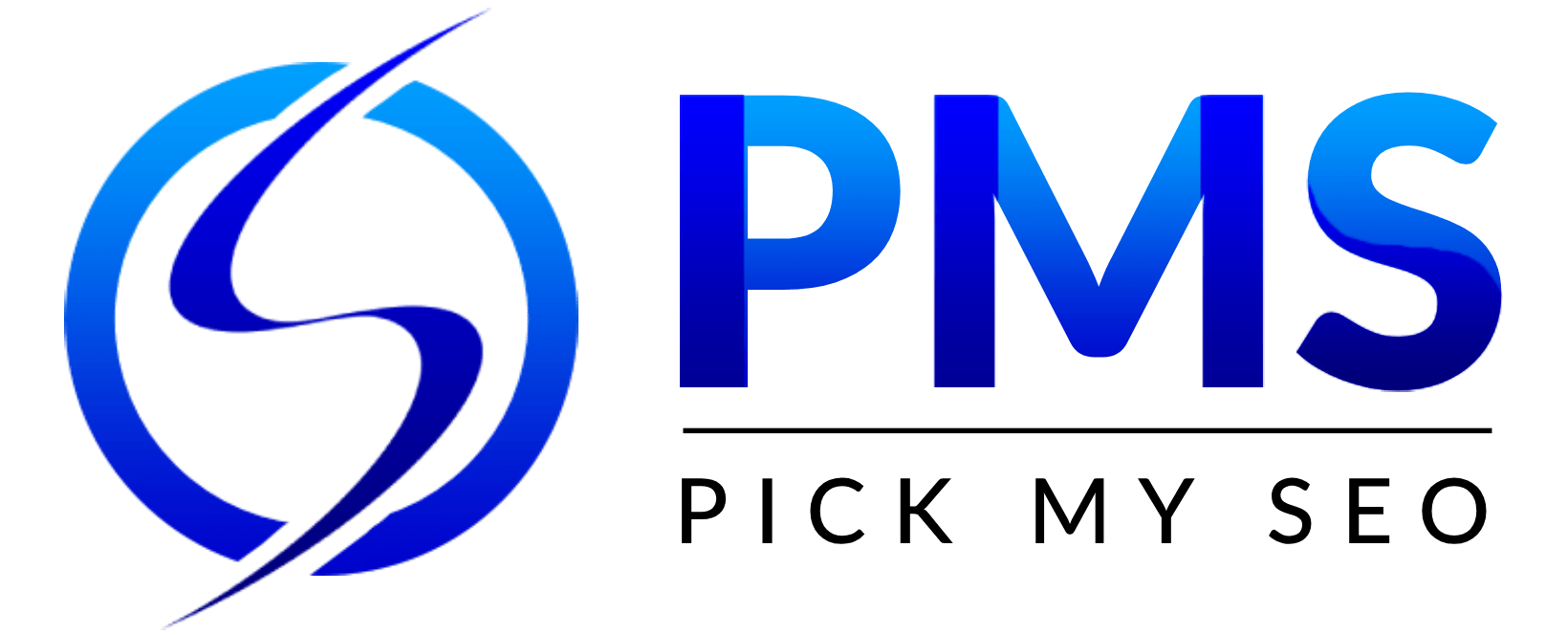
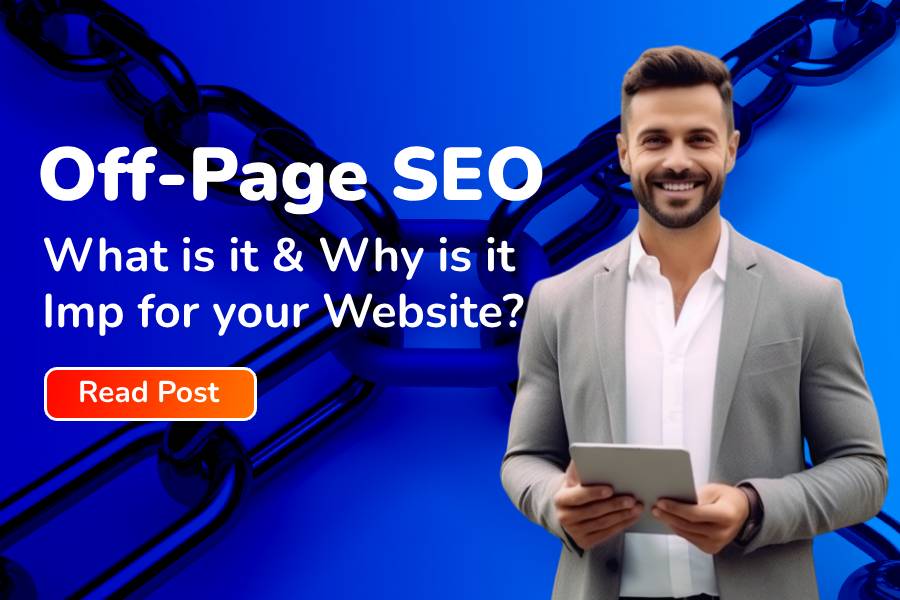
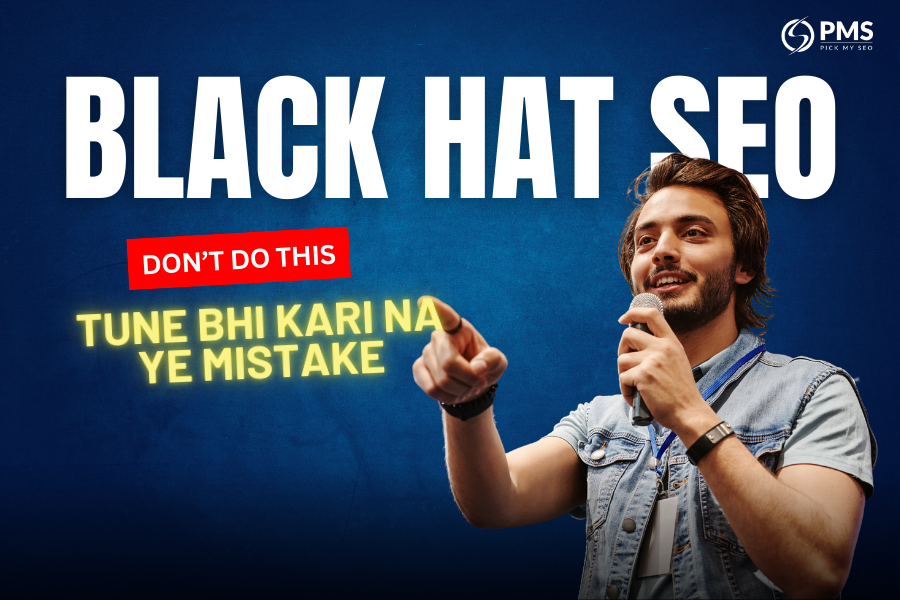
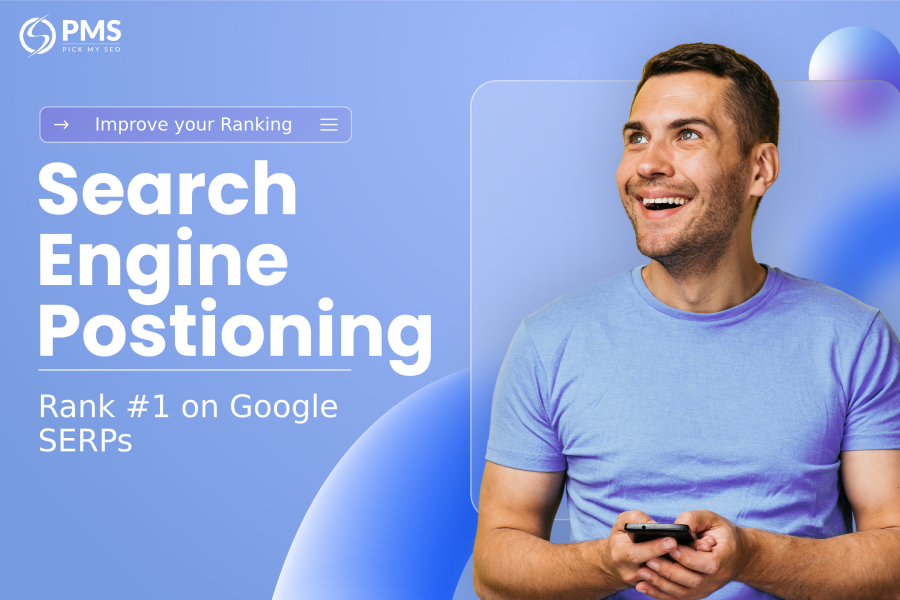


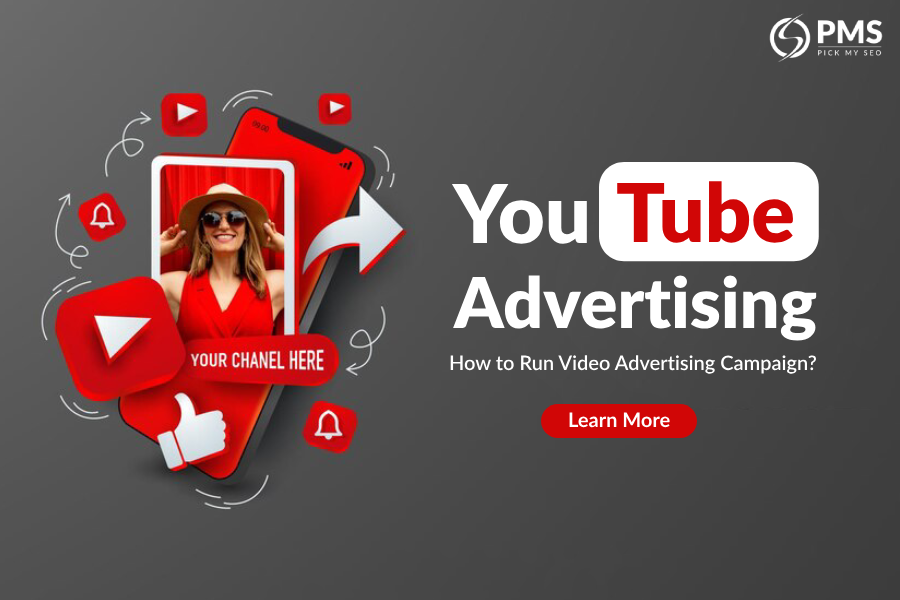
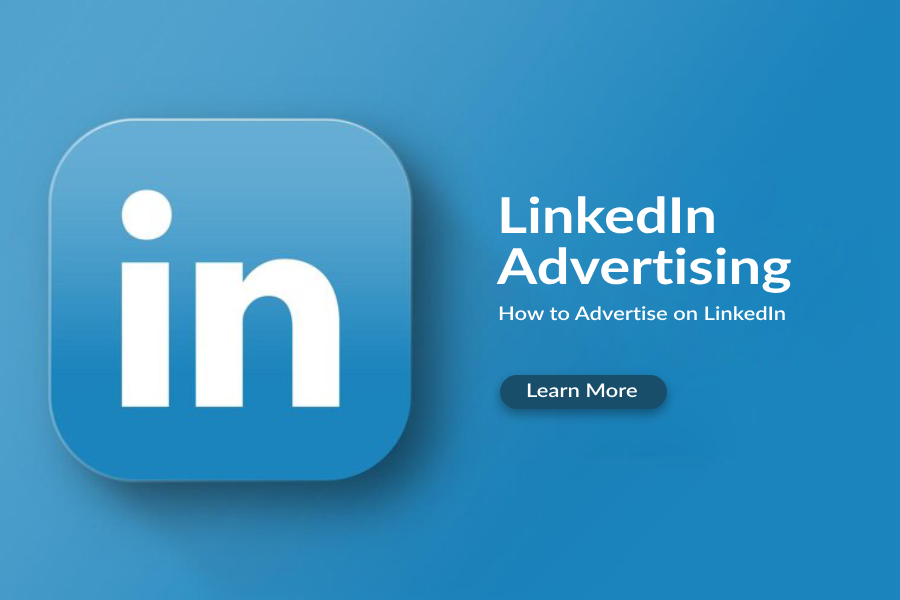
6 thoughts on “Off-Page SEO: What Is It & Why is it Important for Your Website”
I have been exploring for a little for any high-quality articles or blog posts in this kind of space .
Exploring in Yahoo I eventually stumbled upon this website.
Reading this information So i’m glad to express that I have an incredibly excellent uncanny feeling I found out exactly what I needed.
I such a lot indubitably will make certain to don?t
put out of your mind this web site and provides it a glance regularly.
Hey there I am so thrilled I found your blog, I really found you by accident, while I was
looking on Digg for something else, Anyways I am here now and would just like to
say many thanks for a remarkable post and a all round enjoyable blog
(I also love the theme/design), I don’t have time to go through it all at the moment but I have book-marked it and also added in your RSS feeds, so when I have time I will
be back to read much more, Please do keep up the excellent work.
My partner and I stumbled over here from a different web
page and thought I might as well check things out. I like
what I see so now i’m following you. Look forward to looking into your
web page for a second time.
This is very attention-grabbing, You are a very skilled blogger.
I have joined your feed and sit up for looking for extra
of your great post. Also, I have shared your site in my social networks
My partner and I stumbled over here from a different web address and thought I may as well check
things out. I like what I see so i am just following you.
Look forward to going over your web page yet again.
I just like the helpful information you supply for your
articles. I’ll bookmark your blog and take a look at again right here regularly.
I’m somewhat sure I’ll be told lots of new stuff
proper here! Good luck for the next!